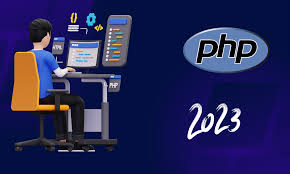You should learn PHP because it's a widely used, versatile, and relatively easy-to-learn programming language particularly well-suited for web development, allowing you to build dynamic websites and applications with features like data processing, form validation, and database interaction, all while benefiting from a large community and readily available frameworks and libraries to support your projects; making it a valuable skill for anyone looking to enter the web development field.
Key reasons to learn PHP:
Wide Applicability:
PHP is used to build a wide range of web applications, from simple websites to complex e-commerce platforms and content management systems.
Ease of Learning:
Compared to other languages, PHP has a relatively simple syntax and learning curve, making it accessible to beginners.
Large Community Support:
Due to its popularity, PHP has a vast community of developers which means ample online resources, tutorials, and forums to help with troubleshooting and learning.
Database Integration:
PHP seamlessly integrates with popular databases like MySQL, allowing for efficient data storage and retrieval.
Framework Flexibility:
Several robust PHP frameworks like Laravel, CodeIgniter, and Symfony provide a structured approach to development, enabling faster and more organized project building.
Open-Source Nature:
Being open-source, PHP is free to use and readily available across different platforms.
Scalability:
PHP can handle both small and large-scale projects, allowing for growth and expansion as needed.
PHP is a widely used open-source scripting language on the server side of web development. This free and open-source coding language is one of the more accessible coding languages to learn while offering advanced features for professional programmers. The majority of the time, PHP is used for making web servers.
Learning PHP can be a valuable skill for several reasons, depending on your goals in web development or software engineering. Here are some key reasons to learn PHP:
---
### **1. PHP Powers a Large Portion of the Web**
- **Widely Used**: PHP is used by 77.5% of websites whose server-side programming language is known, including platforms like WordPress, Facebook (historically), and Wikipedia.
- **Content Management Systems**: Most popular CMS platforms like WordPress, Joomla, and Drupal are built on PHP. Learning PHP allows you to customize and extend these platforms.
---
### **2. Excellent for Backend Development**
- **Server-Side Scripting**: PHP excels in handling backend processes, such as user authentication, database interactions, and file operations.
- **Frameworks for Scalability**: Frameworks like Laravel, Symfony, and CodeIgniter make PHP a modern choice for building scalable web applications.
---
### **3. Beginner-Friendly Language**
- **Easy to Learn**: PHP has a gentle learning curve and straightforward syntax, making it accessible for beginners in programming.
- **Low Barrier to Entry**: PHP doesn’t require complex setups; you can start coding with a simple text editor and a local server like XAMPP or WAMP.
---
### **4. Rich Ecosystem and Resources**
- **Extensive Libraries**: PHP has a vast array of built-in functions and third-party libraries to handle everything from image processing to data encryption.
- **Active Community**: An active community ensures that you can find tutorials, forums, and resources to solve almost any problem.
---
### **5. Compatibility and Flexibility**
- **Platform-Independent**: PHP works seamlessly on all major operating systems like Windows, macOS, and Linux.
- **Database Integration**: It supports numerous databases, including MySQL, PostgreSQL, and SQLite, which are essential for dynamic websites.
---
### **6. Cost-Effective**
- **Open Source**: PHP is free to use, as are many of its frameworks and tools. This reduces development costs for small businesses and startups.
- **Affordable Hosting**: Most web hosts support PHP out of the box, making it cost-effective to deploy PHP-based projects.
---
### **7. High Demand for PHP Developers**
- **Job Opportunities**: PHP skills are in demand, especially for maintaining and developing websites and CMS-based applications.
- **Freelancing and Projects**: PHP is a staple for freelance developers, especially for small business projects and website customizations.
---
### **8. Rapid Prototyping**
- **Quick Development**: PHP's simplicity allows developers to build prototypes and minimum viable products (MVPs) quickly.
- **Iteration-Friendly**: It’s easy to make changes and iterate on PHP projects.
---
### **9. Keeps Evolving**
- **Modern Features**: With PHP 8, the language has added modern programming paradigms like JIT compilation, better type safety, and improved performance.
- **Performance**: PHP has significantly improved over time in terms of speed and memory usage, making it a competitive choice for modern web applications.
---
### **10. Foundation for Full-Stack Development**
- While PHP is server-side, understanding it complements front-end skills (HTML, CSS, JavaScript), enabling you to become a full-stack developer.
---
### **Conclusion**
Learning PHP is worth it if:
- You want to work with web technologies.
- You're interested in building dynamic, database-driven websites.
- You aim to support or develop CMS-based projects.
- You wish to leverage its simplicity to start freelancing or land a backend development job.
It's a practical skill with real-world applications in both small and large-scale web projects.
Here are **additional reasons and considerations** why learning PHP is a worthwhile investment:
---
### **11. Enterprise and Government Use**
- **Legacy Applications**: Many enterprises and government organizations have long-standing PHP-based systems that need maintenance, updates, and optimization. This creates a steady demand for PHP developers.
- **Custom Software**: PHP is frequently used to create custom CRM systems, inventory management tools, and other enterprise solutions.
---
### **12. Integration Capabilities**
- **API Development**: PHP is great for building RESTful and GraphQL APIs that other services or applications can consume.
- **Third-Party Integration**: It integrates seamlessly with services like payment gateways (PayPal, Stripe), social media APIs (Facebook, Twitter), and cloud platforms (AWS, Google Cloud).
---
### **13. Versatility in Projects**
- **Diverse Applications**: With PHP, you can develop everything from simple landing pages to complex web applications, SaaS platforms, and e-commerce websites.
- **E-Commerce Platforms**: Popular platforms like Magento, WooCommerce, and OpenCart are built on PHP, making it essential for e-commerce development.
---
### **14. Performance Improvements with PHP 8+**
- **Modern Performance**: Features like JIT compilation in PHP 8 have drastically improved runtime performance, making PHP competitive for high-performance applications.
- **Scalability**: Frameworks like Laravel and Symfony ensure that PHP can handle large-scale applications with ease.
---
### **15. Abundance of Career Opportunities**
- **Global Demand**: PHP is used across the world, so developers with PHP expertise can find opportunities globally.
- **Freelance Market**: On platforms like Upwork, Freelancer, and Fiverr, PHP is one of the most requested skills for freelance jobs.
---
### **16. Cost and Time Efficiency**
- **Fast Development Cycles**: PHP’s straightforward syntax and integration features mean projects can be developed faster compared to some other backend languages.
- **Affordable Maintenance**: PHP applications are generally easier to maintain and update, saving time and costs in the long run.
---
### **17. PHP for Modern Development**
- **Framework Ecosystem**: Frameworks like Laravel offer features like dependency injection, routing, middleware, and Eloquent ORM, which make modern development efficient and enjoyable.
- **Tooling and Testing**: Tools like PHPUnit and Laravel Dusk provide robust testing capabilities, ensuring code quality and reliability.
---
### **18. Versatility in Hosting**
- **Ubiquitous Hosting Support**: Nearly all web hosting providers support PHP, making it easier to deploy applications.
- **Cloud and Container Support**: PHP can be deployed on modern platforms like Docker, Kubernetes, and serverless environments.
---
### **19. PHP is Everywhere (Real-World Use Cases)**
- **Dynamic Content**: PHP excels at building sites with real-time data, such as dashboards and analytics platforms.
- **User Management**: It is widely used for authentication systems, role-based access control, and membership sites.
- **Custom Platforms**: PHP enables businesses to create unique solutions tailored to their specific workflows.
---
### **20. Long-Term Viability**
- **Stable Ecosystem**: PHP has been around for over 25 years, with consistent updates and an active developer community.
- **Future-Proofing**: With the continuous evolution of PHP (e.g., PHP 8 and beyond), it remains relevant in the modern development landscape.
---
### **21. Ideal for Small and Medium Businesses**
- Many SMBs rely on PHP for building affordable websites and applications because of its open-source nature and low development costs.
---
### **22. Open-Source Tools and Libraries**
- PHP has an extensive ecosystem of libraries and tools to extend its functionality, from PDF generation (TCPDF, DomPDF) to image manipulation (GD Library, ImageMagick).
---
### **23. PHP is Developer-Friendly**
- **Error Reporting**: PHP offers detailed error reporting and debugging options, making it easier to identify and fix issues.
- **Documentation**: PHP has one of the most comprehensive and beginner-friendly documentation resources available.
---
### **24. Community Support**
- **Active Forums**: PHP has a large and active community where developers can ask questions, share knowledge, and find solutions.
- **Events and Conferences**: PHP-related events like PHP Day and Laracon connect developers and help them stay updated with industry trends.
---
### **25. Starting Point for Programming**
- **Foundation for Other Languages**: Learning PHP introduces fundamental programming concepts (e.g., variables, loops, OOP) that can be applied to other languages like Python, JavaScript, or Java.
---
### **26. Security Features**
- **Enhanced Security Practices**: Modern PHP frameworks come with built-in security features like CSRF protection, input validation, and output sanitization, making it safer to develop web applications.
- **Regular Updates**: PHP's development team actively patches vulnerabilities and enhances security.
---
### **27. Open Source Contributions**
- PHP developers can contribute to the global open-source ecosystem by creating plugins, libraries, or CMS themes, gaining recognition and experience.
---
### **28. PHP's Role in Freelancing and Startups**
- PHP is often the go-to language for freelancers and startups due to its ability to deliver MVPs (Minimum Viable Products) quickly and cost-effectively.
---
### Final Thoughts:
Learning PHP can be **strategic** for beginners and professionals alike due to its wide applicability, demand, and compatibility with modern web technologies. It provides a strong foundation in web development while opening doors to a variety of career paths in programming.
it's a widely used, versatile, and relatively easy-to-learn programming language
Trending...
Related posts
Essential First Aid Tips for Common Diseases You Should Know Healthy
Delicious Indian Street Foods You Can Now Make at Home Food
10 Genius Travel Hacks That Will Save You Money in 2025 Blog
7 Mind-Blowing Tech Gadgets You Didn't Know You Needed in 2025 TechWorld
At Least 20 Tourists Killed In Pahalgam, 'Were Shot For Not Being Muslim': What We Know So Far About J&K Terror Attack Travel
A warm message to that kind of person , Who thinks different.. Blog
Chennai Express Shooting Locations: You Must Visit At Least Once Travel
Chennai Diaries: Kshitiz Kumar's Sunday Stroll at Marina Beach Travel
How to apply application for PHD Entrance test of Ranchi University 2025 Guides
Aryan and Ananya love story at ranchi (Podcast by kshitiz ) Episode :2 Blog
Aryan an Ananya love story starts at ranchi (coverd by kshitiz) part 1 Blog
TCS NQT (National Qualifier Test) Honest Review by Kshitiz Kumar TechWorld
Kasol is a hamlet in the Kullu district of the Indian state of Himachal Pradesh Travel
Haryana: A Land Steeped in History and Nature’s Bounty Travel
Punjab: A Land Where Every Heart Beats to the Rhythm of Bhangra Travel
Uttarakhand: Where Nature and Spirituality Embrace You Travel
Shimla: The Enchanting Queen of Hills Awaits You! 🌄 Travel
Laravel mostly used codes during project development Coding
Bersache is a brand that sells sports and casual footwear for men and women. Blog
Jharkhand Election Result 2024: जीत के बाद बोले सीएम हेमंत सोरेन, ‘साथ चलकर सोना झारखंड के निर्माण का लें संकल्प’ Blog
Netarhat, often referred to as the "Queen of Chotanagpur" Blog
Battlegrounds Mobile India 3.5 will be the biggest update of the year; here is why TechWorld
We celebrate diwali in much happier frame of mind 😊 LifeStyle
Business Insider Business News India: Latest Business News Today, Share TechWorld
I am watching whole ranchi from the top in the night in diwali Blog
Diwali 2024 highlights: The Deepotsav celebrations featured around 1,100 people performing a special aarti on the banks of the Saryu river. LifeStyle
Western Railway to run unreserved special trains for Bandra-Gorakhpur and Udhna-Chhapra routes Travel
South Indian food is known for the use of generous coconut in their curries Food
CMRL stands for Chennai Metro Rail Limited, a joint venture between the Government of India and the Government of Tamil Nadu that builds and operates the Chennai Metro Travel
You might be interested in
-
At Least 20 Tourists Killed In Pahalgam, 'Were Shot For Not Being Muslim': What We Know So Far About J&K Terror Attack
2025-04-22 17:45:59 503 views -
I am traveling at Nandanam metro chennai
2025-08-22 13:46:17 152 views
Home
-
test1
03 December 55 views -
test1
03 December 45 views -
Just A Game Wkwk
27 October 481 views
Travel
-
I visited a beautiful place at renukoot
26 June 156 views -
Chennai Express Shooting Locations: You Must Visit At Least Once
27 January 11095 views
Guides
-
How to apply application for PHD Entrance test of Ranchi University 2025
08 January 456 views -
Tourist Places in Ranchi
28 November 1893 views -
The Sacred Shores of Puri
28 November 473 views
Food
-
Delicious Indian Street Foods You Can Now Make at Home
06 September 120 views -
आलू पराठा रेसिपी (घर का बना पंजाबी स्टाइल)
17 November 417 views -
Are you black tea lover.????
17 November 498 views
Coding
-
Laravel mostly used codes during project development
24 November 362 views -
How to write email codes without SMTP
24 November 367 views
Review
- No posts available.
Healthy
-
Essential First Aid Tips for Common Diseases You Should Know
06 September 115 views
LifeStyle
-
Visited Ranchi Johna Fall
20 November 457 views -
We celebrate diwali in much happier frame of mind 😊
17 November 586 views
Blog
-
10 Genius Travel Hacks That Will Save You Money in 2025
06 September 143 views -
My best Playlist for all time
03 September 121 views -
T nagar at chennai
22 August 135 views
TechWorld
-
AI Tools That Will Skyrocket Your Productivity
06 September 110 views -
7 Mind-Blowing Tech Gadgets You Didn't Know You Needed in 2025
06 September 172 views -
The Alternate way to run Laravel site
28 January 255 views
Lyrics
-
Hanuman Chalisa
17 November 400 views
Categories
Home
Show all Blog Posts.
Travel
Travelling is the cure for Health and Soul.
Guides
We always need a guide for our lives.
Food
Food is a big part of our life.
Coding
Coding is the Era of New Tech India.
Review
Review is now going to import things for Anything.
Healthy
Health is wealth , we should never ignore it.
LifeStyle
Our lifestyle decides our health.
Blog
Blog is a great source of Knowledge and skills.
TechWorld
We are here to define all tech things for our
Lyrics
Songs





































Comments
Leave a Reply